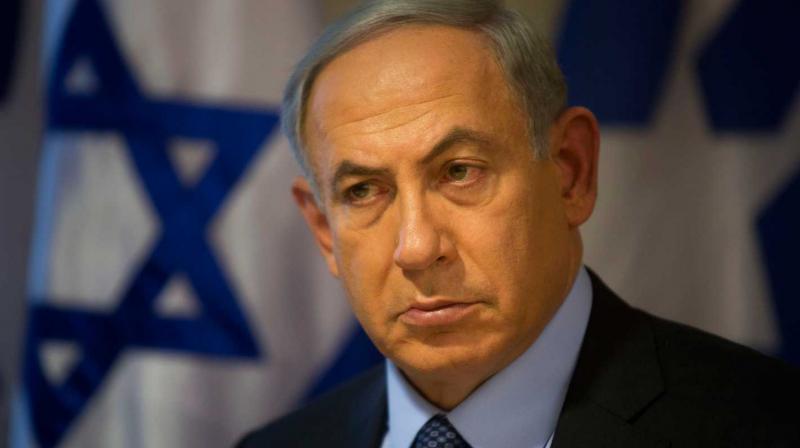Israel PM battles for survival as exit polls show race too close to call
Dubbed \'King Bibi\' by his supporters, Netanyahu had already been stung by his failure to form a government after an election in April.

Jerusalem: Prime Minister Benjamin Netanyahu's battle for political survival looked set to stretch on after exit polls following Tuesday's election showed the race too close to call and Israel's longest-serving leader weakened.
The surveys by Israeli TV stations gave Netanyahu's right-wing Likud 31 to 33 of parliament's 120 seats, versus 32 to 34 for centrist Blue and White led by former General Benny Gantz.
Neither had enough support, at first glance, for a governing coalition of 61 legislators and Netanyahu's ally-turned-rival, former Defence Minister Avigdor Lieberman, emerged as a likely kingmaker as head of the far-right Yisrael Beitenu party.
"Netanyahu has lost, but Gantz hasn't won," said Udi Segal, a prominent Israeli television news anchor.
Without Yisrael Beitenu's projected eight to 10 seats, a stalemate would ensue: Likud would have the support of only up to 57 legislators for a right-wing coalition, and Blue and White could enlist no more than 59 for a centre-left government.
"We have only one option - a national, liberal, broad government comprising Israel Beitenu, Likud and Blue and White," said Lieberman, whose projected tally was double the result in April.
Dubbed "King Bibi" by his supporters, Netanyahu, 69, had already been stung by his failure to form a government after an election in April.
Looming corruption charges — he has denied any wrongdoing — have also chipped away at Netanyahu's seeming invincibility, 10 years into consecutive terms as prime minister marked by a sharp focus on security that resonated with voters.
"Unless that miraculous turnabout between the exit polls and the actual results happens — the Netanyahu magic has been broken," Anshel Pfeffer, author of a Netanyahu biography, wrote in the left-wing Haaretz daily.
Addressing supporters after the exit polls, Lieberman appealed to President Reuven Rivlin to invite Netanyahu and Gantz to meet as early as Friday, even before final results are in, to explore the formation of a national unity government.
Coalition-building could be complicated: Lieberman has said he would not join an alliance that included ultra-Orthodox parties - Netanyahu's traditional partners. Gantz has ruled out participating in an administration with Netanyahu if the Israeli leader is indicted on looming corruption charges.
SLIGHT DIFFERENCES
The two main parties' campaigns pointed to only narrow differences on many important issues: the regional struggle against Iran, the Palestinian conflict, relations with the United States and the economy.
An end to the Netanyahu era would be unlikely to bring about a significant change in policy on hotly disputed issues in the peace process with the Palestinians that collapsed five years ago.
Netanyahu has announced his intention to annex the Jordan Valley in the occupied West Bank, where the Palestinians seek statehood.
But Blue and White has also said it would strengthen Jewish settlement blocs in the West Bank, with the Jordan Valley as Israel's "eastern security border".
As in the election five months ago, Netanyahu's opponents, including Gantz, focussed on bribery and fraud allegations against the prime minister in three corruption cases. Netanyahu is due to face a pre-trial hearing in October to argue against the charges being filed.
An election loss could leave him more at risk of prosecution, without the shield of parliamentary immunity that his political allies had promised to seek for him.
There is no certainty they would stand by a weakened leader without an obvious public mandate in any coalition-building.
Netanyahu portrays Gantz, 60, as inexperienced and incapable of commanding respect from world leaders such as U.S. President Donald Trump.
Before the last election, Trump gave Netanyahu a lift with U.S. recognition of Israeli sovereignty over the Golan Heights, captured from Syria in the 1967 Middle East war. This time, the White House seems more preoccupied with Iran.
The Trump administration plans soon to release an Israeli-Palestinian peace plan that may prove a dead letter: The Palestinians have rejected it in advance as biased.
Netanyahu's open door in Washington and other world capitals, at a combustible time on Israel's borders with Syria, Gaza and Lebanon, remains a big draw domestically.
In the final hours of campaigning, Netanyahu strained every sinew, urging voters to support him to avert what he described as the "disaster" of a left-wing government.
His voice hoarse, the veteran leader took to the streets and social media, at one point using a megaphone in Jerusalem's bus station, to appeal to voters to extend his unbroken decade in power.
"There's no one else running who is worthy of being prime minister," said Alon Gal, a 53-year-old hi-tech manager. "With (Netanyahu), at least I know who I am dealing with."
In Gaza, Palestinians awaited the results of the vote.
"This election affects many things in our life," said Mohamad Abdul Hay Hasaneen, a janitor in the city of Khan Younis. "There might be limited escalations after the election, but I don’t think this would result in a full war."
Catch the latest news, live coverages and in-depth analyses from India and World. Follow us on Facebook and Twitter.

